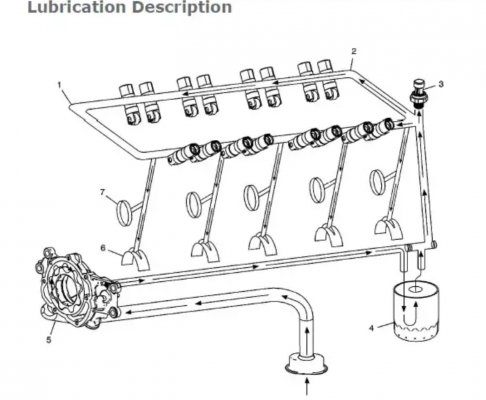A few other comments:
1. After a lot of searching about 6.2l engine failures, it became clear that the majority of what I was finding were failures with the front main bearing and/or the #1 and #2 rod bearings. #1 and #2 rod bearing failures are likely tied to the #1 main bearing failure/oil starvation. Yes there are other failures as well to include other main and rod bearings and the thrust bearing. But front main and rods #1 and #2 were far more common. I even found a few posts from dealer techs and one mentioned he had 5 front main bearing failures on the 6.2l engine.
2. If you tow with your 6.2l, there is NO WAY I would run 0W20 oil in the engine. Depending on the amount of weight you are towing, this can and will put a far greater load on the engine bearings as well as heat the oil up. This becomes a severe duty situation when towing more that 1000 lbs IMHO. And if you tow with the truck loaded with gear and people then any towing may be severe duty. The rear main bearing and thrust bearings can take more loading when towing. So I would be very concerned about 0W20 protection when towing.
3. Oil consumption will also be lower with 5W30 rather than 0W20. So if you are having oil consumption issues and are tired of always checking and worrying about the oil level, consider running 5W30 oil.
4. While the previous generation engines started to use 0W20 in the later years, it looks like the earlier documentation indicated either 10W30 or 5W30 oil. I have not really tracked what changed with the 2020 and earlier 6.2l engines other than AFM vs DFM, I need to check if the earlier AFM generation engines ran the 2 stage oil pump.
5. Keep in mind the DFM will not likely be active until the engine is warmed up and at least is Closed Loop fuel control operation, but I would also bet the DFM may not become active until a specific engine temperature. So the 0W portion of the oil is probably not as important for any DFM operation.
I am less on board about supplier quality issues with bearings and more about oil starvation. As for the valve lifter situation, maybe this was a supplier issue?? The valve lifter issue seems to have either been minimized or has totally been overshadowed due to the bearing/engine failures. I do not think bearing technology has changed significantly in the past few decades unless someone was trying to get lower friction bearings for fuel economy and foolishly changed the bearing design.
Not sure how many people actually contacted NHTSA, but searching online there are A LOT of failures. Even out of the failures, I am sure a good percentage of the owners never posted anything on forums or social media. Some may have said screw it and just worked out a trade and moved on. I hope the NHTSA staff starts to search for failures online, but this is a lot to ask from your average government employee. But maybe they will surprise all of us.
I hope there is a resolution to these bearing failures, but like anything GM will trade off what replacement engines cost is vs any fines and penalties they may incur if they suggest a change of oil type. I expect that GM will run all sorts of formulas and scenarios to come up with a failure percentage that the NHTSA can agree is acceptable and this will be the end of things. GM will not likely issue a "Recall" to replace engines IMHO, they will try to solve this with a few new pieces of paper and/or reprogram the OLM/OCI. But this does nothing for all of us that may have engines that have premature wear and are partially compromised at this point.
As the world burns!

